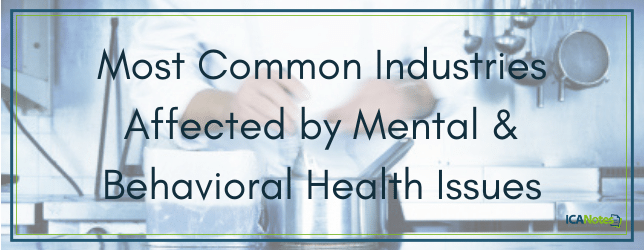Most Common Industries Affected by Mental and Behavioral Health Issues
Mental health in the workplace is a critical issue, but it’s one that businesses routinely ignore. Unlike physical ailments, people with mental health issues are often expected to “tough it out” and not let the issues interfere with work. While it is a medical certainty that disorders like depression, ADHD and excessive anxiety can affect work performance, workplace resources for people with mental health issues are woefully few.
So who are most in need of improvement when it comes to workplace mental and behavioral health issues?
Industries With the Highest Rates of Mental Health Issues
Some industries that have the highest rates of mental health issues include:
- Retail
- Manufacturing
- Food and beverage
In these industries, you often see higher-than-usual levels of absenteeism, employee substance abuse, worker dissatisfaction, reduced productivity or high levels of conflict.
Reasons for Mental Health Issues in the Workplace
While mental health is a function of a variety of things, including brain chemistry, home environment and family history, there are a few workplace factors that can also contribute.
One of the largest of these is stress. People who suffer from high levels of anxiety or depression often also report very high workplace stress. High workplace stress can lead to a variety of physical health problems as well.
Another issue is a lack of physical exercise. Workers who get the opportunity to get sun and exercise during the day tend to do much better than those who are stuck in cramped offices, standing behind a counter or sitting at a desk all day, every day.
Conflict is another factor. Those who have to deal with potentially unpleasant people, such as a retail customer who might be angry or aggressive, often report higher levels of depression or other mental health issues.
Another very important contributor to mental health in the workplace is an employee’s feeling of importance or relevance. When an employee feels like their efforts matter and are being noticed by their superiors, they are less likely to experience depression than those who feel they are being ignored, are expendable or are meaningless to their employer.
Ways to Improve Mental Health in the Workplace
There are many mental health conditions that require the care of a mental health professional. In these cases, the best thing an employer can do is to be sympathetic and supportive of the employee’s efforts to recover.
There are also some steps an employer can take to improve the workplace atmosphere, such as:
- Ensuring employees take breaks
- Praising employees for a job well done
- Putting measures in place to allow employees to feel heard by superiors
- Allowing mental health days when necessary
It’s important to remember that improving mental health in the workplace benefits employers, too. Mentally healthy individuals tend to work harder, longer and more efficiently than those who are suffering.
If you are a mental health professional working with people who have workplace issues, an intuitive, user-friendly EHR can help you organize your patient files and billing. Contact ICANotes for a live demo of our highly effective behavioral health records software.
Related Posts:
Strategies for Reducing Stress, Anxiety and Burnout in the Workplace

